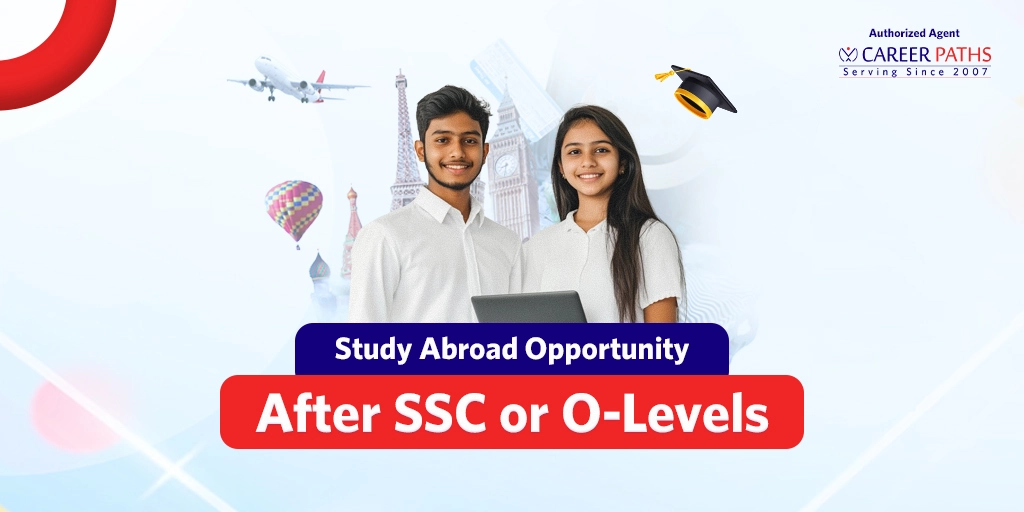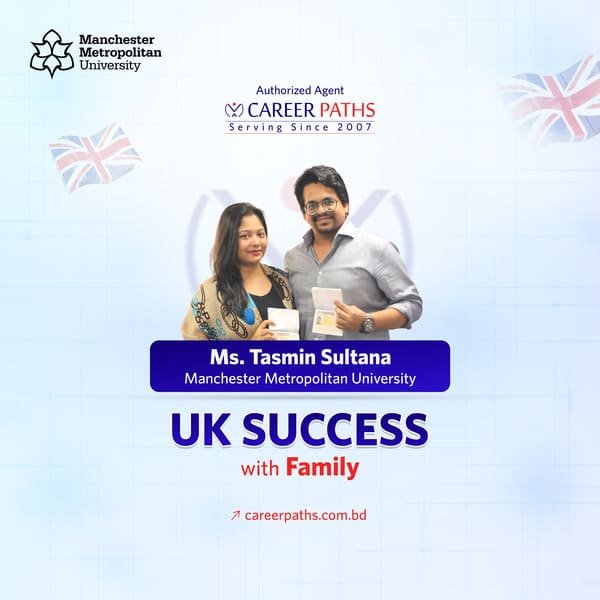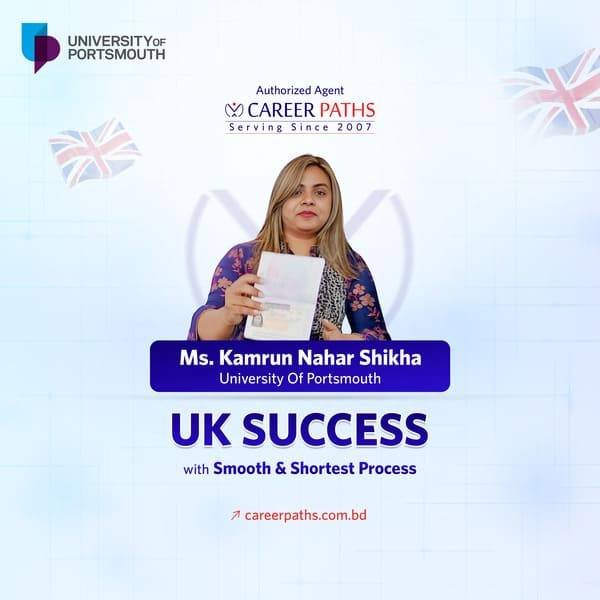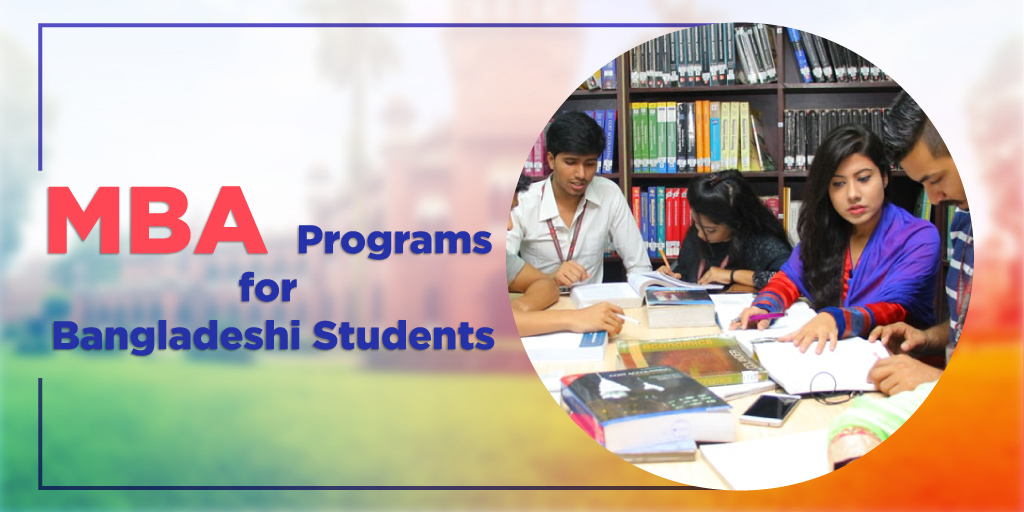
Completed your Secondary School Certificate (SSC) Examination and stand in a boundless doubt about your next step?
Studying abroad after SSC with a foundation program can be a logical solution in this aspect, as it ensures a high-quality education and a bright professional path. You can explore numerous pathways to study abroad and choose a perfect one that suits you best. Upon completing a foundation program, you can progress to an undergraduate program and reach your dreams.
Destinations to Study Abroad after SSC/O-Levels
After completing your SSC, you can choose to study in a variety of countries, including Malaysia, the UK, the USA, Canada, Sweden, Australia, New Zealand, France, Denmark, Spain, Norway, Switzerland, and many others. Among these, the UK and Malaysia are the top preferred destinations for Bangladeshi students to continue their studies after SSC/O-Levels.
Why Choose to Study Abroad after SSC/O-Levels
There are various convincing reasons to study abroad. As we know, quality education empowers upward socioeconomic mobility and is a vital element in escaping poverty, so investing in quality education, both time and money, can bring a prosperous future for us. For a bright future, we need to be imaginative, ambitious, and curious, and must be experienced in a unique approach to teaching-learning, which boosts analytical thinking skills, creativity, and solution-focused mindsets. In developed countries, Universities usually have solid links with varied industries–from science to arts to management and more–ensuring huge opportunities to learn from real-life experience that enhances professional connections and provides an unbeatable edge over the competition. Therefore, this journey may bring you both conceptual understanding and empirical application, which are vital for solving problems, while also allowing you to interact with people from varied backgrounds and cultures, which will broaden your global outlook.
Progression into an undergraduate with a Foundation Program
After completing the Foundation Program, you will shift into undergraduate programs based on your subject choice. Foundation programs at Asia Pacific University of Technology and Innovation solidify the concepts that underpin the study of Accounting, Banking, Finance, Actuarial Studies, Business and Management, Computing and Technology, Engineering, Industrial Design, Digital Marketing, Animation and Visual Effects, Media and Communications, International Studies, or Psychology. At Taylor’s University, the Foundation Programs are committed to providing a range of opportunities, including intensive guidance, learning beyond the classroom, mentoring, internships, training, and projects. The main feature of the Foundation Program at Segi University is its approach of “Industry into Classroom” which intermingles real industry projects into coursework and assignments, giving students practical learning opportunities from both academic lecturers and industry professionals. Universities in Australia, the United Kingdom, the United States of America, New Zealand, and other countries recognise Foundation Programs of HELP University. Upon completion of the International Foundation Program at the University of London, you can progress to most UK universities. Let’s see these opportunities in a concise –
- Progression into the desired undergraduate program
- Internships and projects
- Learning with industrial engagements
- A gateway to study in multiple countries and universities
Universities and Programs: Entry Requirements
There are various options available to study abroad after SSC/O-Levels. You can have a look at some programs & key points, which are mentioned below:
Study in Malaysia after SSC/O levels
Foundation Program
Academic Requirements:
Minimum 5 credits at SSC/O-Levels (including Mathematics for most programs; Science subjects required for Science/Engineering/Computing foundations).
English Requirements:
IELTS 4.0 / TOEFL iBT 30–31 / PTE 36 (many universities also accept internal placement tests).
Program Duration:
1 year (3 semesters)
Tuition Fees (Average):
RM 18,000 – RM 28,000 for the full program
Progression:
Leads directly to Bachelor’s degree programs
Diploma Program
Academic Requirements:
- 3–5 credits at SSC/O-Levels (varies by program).
- Mathematics required for Engineering/Computing; Science subjects for Health/Science diplomas.
English Requirements:
IELTS 4.0 or equivalent
Program Duration:
2–2.5 years (depending on university & major)
Tuition Fees (Average):
RM 25,000 – RM 40,000 for the full program
Progression:
Can enter directly into Year 2 of a Bachelor’s degree (credit transfer option)
Study Gap & Age Requirement
Study Gap:
- Generally, up to 5 years gap is accepted after SSC/O-Levels for Foundation/Diploma.
- Longer gaps may require additional justification (work experience, short courses, etc.)
Age Requirement:
- Minimum: 16 years old (at the time of enrollment).
- No strict maximum, but most students are 16–24 years old for Foundation/Diploma.
Here are some of the top universities in Malaysia that offer excellent foundation courses after SSC/O-Levels
Malaysian University List Ranking & Location:
University Name | Rankings | Location |
Asia Pacific University of Innovation & Technology (APU) | QS Ranking 597 THE Ranking 801-1000 | Kuala Lumpur |
Taylor’s University | QS Ranking 253 | Subang Jaya, Selengor |
SEGi University | QS Ranking 731-740 THE Ranking 1001-1500 | Kuala Lumpur |
HELP University | QS Asian Ranking 105 | Kuala Lumpur |
Multimedia University(MMU) | QS Ranking 851-900 THE Ranking 1001-1200 | Cyberjaya and Melaka |
University of Cyberjaya | QS Ranking 951-1000 THE Ranking 601-800 | Cyberjaya |
Xiamen University | QS Ranking 341 THE Ranking 301-350 | Sepang, Selengor |
Universiti Teknologi Malaysia (UTM) | QS Ranking 153 THE Ranking 401-500 | Johor |
Universiti Tenaga Nasional (UNITEN) | QS Ranking 551 THE Ranking 601-800 | Kajang, Selengor |
[Note: QS Rankings based on 2026 and Times Higher Education Rankings (THE) based on 2025]
Study in UK after O levels
Foundation Program (International Foundation Year / Pathway)
Academic Requirements:
- O-Levels/SSC with 4–5 subjects passed at grades A to C in relevant subject
- Relevant subjects may be required (Maths & Sciences for STEM, etc.).
English Requirements:
- UKVI IELTS 4.5–5.5 Must achieve a minimum of 4.0 in each of the four components
Program Duration:
- 1 year (9–12 months).
Progression:
Leads to Year 1 of a Bachelor’s Degree at the host university.
Diploma Program: (International Year One/ Business/Computing/Engineering)
[Note: not all universities offer this, but many UK universities do via Study Centres like INTO, Kaplan, Navitas, Study Group]
Academic Requirements:
- O-Levels/SSC with good grades A to grades C in relevant subjects
- Slightly higher than Foundation requirements.
English Requirements:
- UKVI IELTS 5.5–6.0 overall.
Program Duration:
- 1 year (equivalent to Year 1 of university)
Progression:
- Direct entry into Year 2 of Bachelor’s Degree.
Tuition Fees (Average)
Foundation Program (International Foundation Year / Pathway):
2500 GBP– 6000 GBP (depending on university and subject, e.g., Arts vs STEM/Engineering).
Living Cost:
1500 GBP per month (UKVI requirement; varies by location)
Study Gap & Age Requirement
Study Gap:
- Foundation/Pathway programs usually accept up to 3–5 years gap after SSC/O-Levels.
- Longer gaps may require strong justification (work experience, further study, etc.).
Age Requirement:
- Minimum: 17 years old (by 31 December of enrollment year).
- No strict maximum, but most students enter Foundation between 17–20 years old
Here are some of the top universities in UK that offer excellent foundation courses after SSC/O-Levels
UK University List Ranking & Location
University | Rankings | Location |
Oxford Brookes University | QS Ranking 374 THE Ranking 601-800 | Oxford |
University of Leeds | QS Ranking 86 THE Ranking 123 | Leeds |
University of Surrey | QS Ranking 262 THE Ranking 201-250 | Guildford |
University of Strathclyde | QS Ranking 251 THE Ranking 351-400 | Glasgow |
University of Sussex | QS Ranking 278 THE Ranking 201-250 | Brighton |
Royal Holloway University of London | QS Ranking 461 THE Ranking 401-500 | London |
Cardiff University | QS Ranking 181 THE Ranking 201-250 | Cardiff |
University of Huddersfield | QS Ranking 524 THE Ranking 501-600 | Huddersfield |
Kingston University | QS Ranking 660 THE Ranking 801-1000 | South West London |
Durham University | QS Ranking 94 THE Ranking 174 | Durham |
University of Southampton | QS Ranking 87 THE Ranking 97 | Southampton |
University of Sheffield | QS Ranking 92 THE Ranking 105 | Sheffield |
Queen Mary University of London | QS Ranking 110 THE Ranking 135 | London |
[Note: QS Rankings based on 2026 and Times Higher Education Rankings (THE) based on 2025]
Prepare the Required Documents
A valid passport, academic certificate and transcript, proof of language proficiency, and other necessary documents required by the programmes.
Language Proficiency Tests
Universities in English-speaking countries and other universities that hold a medium of instruction in English require proof of your English level for admission. This guarantees that you are able to participate in classes, understand lectures, make conversations with teachers and peers, write essays, give presentations, and communicate with others when necessary. Therefore, you must sit for a language test and achieve the required score. There are varied language proficiency tests, including IELTS, TOEFL, PTE, Duolingo, TOEIC, CELPIP, Cambridge English, and so on. Among these tests, IELTS and TOEFL are the most popular around the world. Generally, these tests measure four skills, such as Listening, Reading, Writing, and Speaking. You should take preparation to sit for a test if you wish to study abroad.
Financial Planning
As we know, studying abroad is expensive, excluding full-funded scholarships and other similar opportunities; therefore, it is wise to prepare a financial plan to study. Tuition fees and living costs are two major expenditure parts, together with travel, insurance, and other expenses. Take a calculator and make a calculation and finalise the decision if it seems affordable to you.
Submit Application
Upon completing the earlier steps, you can submit an application. You should be very careful while applying to avoid unwanted mistakes, which can lead to your refusal and further complications. So be careful and check every information you provide before finally submitting. You can also take our assistance from Career Paths in properly submitting applications and finding suitable programmes for you. Career Paths ensures a smooth admission aids, and consulting support with more than 17 years of experience. It is the most authentic and reliable Education Consultancy Firm in Bangladesh. It maintains transparency in every step and is committed to making fast admission and visa procedures, along with other supports.











